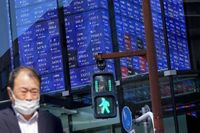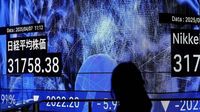On Monday, April 7, 2025, Asian and Australian stock markets opened to alarming losses, signaling deepening concerns over the escalating trade war between the United States and China. The Nikkei index in Tokyo was down 8 percent shortly after the market opened, while the Hong Kong stock exchange plummeted by more than 12 percent. The Taiwan stock exchange also faced significant losses, dropping over 9 percent within the first hours of trading.
Market analysts attribute these dramatic declines to the recent import tariffs imposed by U.S. President Donald Trump, which threaten to disrupt international trade. In response to these tariffs, China announced retaliatory measures last Friday, imposing a staggering 34 percent levy on American goods, marking a significant escalation in the ongoing trade conflict between the world’s two largest economies.
The fallout from these developments has not only affected stock markets but also the value of cryptocurrencies. Bitcoin, which was valued at approximately 86,000 dollars at the end of March, has now dropped to around 76,000 dollars. This decline reflects investor anxiety over the potential economic ramifications of a full-blown trade war. Earlier in January 2025, Bitcoin had reached a peak value of 105,000 dollars.
In addition to the sharp declines in stock prices, the Australian stock market fell by 6 percent within just fifteen minutes of opening on April 7, 2025. Furthermore, the exchange rate of the Australian dollar dipped below 0.60 U.S. dollars, a level not seen since April 2020. These shifts underscore the growing instability in the global financial landscape as investors react to the trade tensions.
Bruce Kasman, head of economics at JP Morgan, expressed serious concerns about the implications of the current trade policies. He stated, "The magnitude and disruptive impact of the U.S. trade policy could be sufficient to push both the U.S. and global economy into a recession." Kasman estimates the likelihood of a recession at 60 percent, highlighting the gravity of the situation and the potential for widespread economic consequences.
As the markets opened on Monday, the mood among investors was decidedly pessimistic. Erik Mauritz, a senior advisor at Trade Republic, noted that he sees no immediate solution to the dramatic declines in stock prices. "What we are witnessing is a profound reaction to the uncertainty surrounding international trade and the implications of these tariffs," he commented.
The situation has been exacerbated by the ongoing trade tensions that have characterized U.S.-China relations in recent years. The latest tariffs, which were announced by Trump, have sparked fears of a prolonged trade war that could have far-reaching effects on global supply chains and economic growth.
In addition to the stock market turmoil, other sectors are feeling the pressure. The Indian stock market also reported losses, dropping nearly 4 percent on the same day. Meanwhile, the Australian market’s performance continues to raise alarms, as its decline reflects broader regional instability.
Investors are now left grappling with the uncertainty of how long these trade tensions will last and what further actions might be taken by either side. The imposition of tariffs has not only affected stock valuations but has also led to increased volatility in currency markets, creating a challenging environment for businesses and consumers alike.
As the situation develops, analysts will be closely monitoring the responses from both the U.S. and Chinese governments. The potential for further retaliatory measures could continue to escalate tensions, leading to even more significant market fluctuations.
In a statement to reporters, President Trump remarked, "Sometimes a medicine is needed to make things better." This comment reflects his administration's stance that the tariffs are necessary to protect American interests, despite the immediate negative impact on markets. However, many economists are warning that the long-term effects could be detrimental.
The global economy is at a critical juncture, and the decisions made in the coming days and weeks will be pivotal. Investors and policymakers alike are watching closely to see how these developments unfold and what strategies will be employed to mitigate the potential fallout.
In summary, the opening of the Asian and Australian markets on April 7, 2025, serves as a stark reminder of the interconnectedness of global economies and the potential for trade disputes to have widespread consequences. As tensions rise, the outlook remains uncertain, with many fearing that the worst is yet to come.







